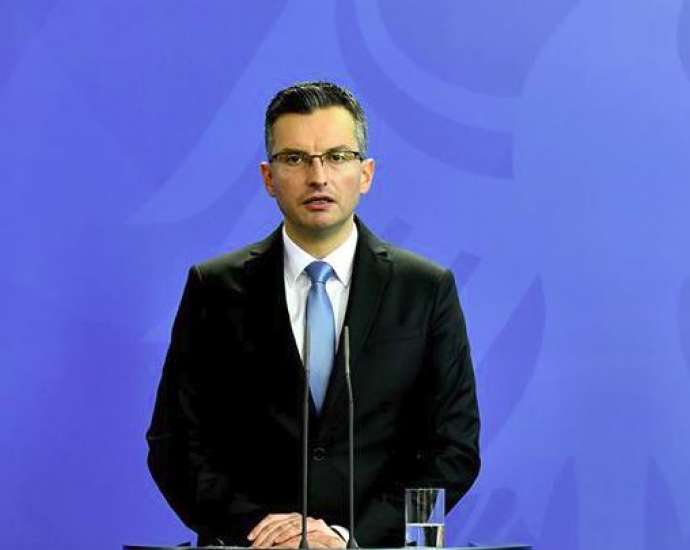STA, 19 January 2020 - The Marjan Šarec government is entering a new challenging period as Karl Erjavec, the mainstay of Slovenian government politics for 15 years, announced he was withdrawing from public life after losing the contest for the leadership of the Pensioners' Party (DeSUS) to Aleksandra Pivec.
Campaigning on an alternative vision of the party's future in a desire to make it more inclusive and collaborative, Pivec, the 47-year-old serving as agriculture minister, won 143 votes at Saturday's congress to Erjavec's 80 in a development that few had expected.
As soon as the results were declared, Erjavec announced his intention to resign as defence minister. Taking a step further, he issued what he described as his "last political statement" on the morning after, announcing that he was withdrawing from public life altogether.
"Since 2004 I have been part of all the governments, served as minister in various departments (...) after the congress's decision that I will no longer lead DeSUS, I see no reason to continue as a minister or government member any longer," the 59-year-old said in a written statement.
While Erjavec is willing to discuss the timing of his resignation with Prime Minister Marjan Šarec so as not to cause any inconvenience to the government, his decision is expected to put the ruling coalition in a tight spot as it struggles to secure a majority to appoint his replacement.
Sources close to the Pensioners' Party (DeSUS) say that quick moves are not to be expected, because any potential candidate to succeed Erjavec at the ministerial post would first need to get the endorsement of the party bodies, which are yet to formed anew in the coming weeks following the congress.
While Šarec was quick to welcome Pivec's victory on Saturday night, he has not yet commented on Erjavec's decision to resign as minister, and coalition parties have been mostly muted in their reactions, but appear to be concerned about how to muster a majority needed to appoint a new minister.
Matjaž Han, the leader of the deputy faction of the Social Democrats (SD) is aware that "it will be absolutely hard to get a new minister through parliament".
The narrow vote on Angelika Mlinar, the cohesion policy minister, in December showed how precarious the ruling coalition's position became after the Left withdrew its support, with the opposition National Party (SNS) staying away in order to tip the scales as even one DeSUS member voted against Mlinar.
Rok Čakš, the editor of the news portal Domovina, said that Šarec was probably not happy with Erjavec's standing down as minister, even though he preferred Pivec as a non-confrontational person at the helm of the coalition partner, and pulled some strings to make that happen.
"Not because the prime minister would be happy with his [Erjavec's] work, but because it means he will have to put forward a new ministerial candidate to the National Assembly. As seen in the case of Angelika Mlinar, securing the required parliamentary majority is all but a routine for the Šarec minority government," Čakaš commented.
By contrast, even as admitting that developments remain unpredictable, analyst Andraž Zorko from the pollster Valicon maintained that DeSUS's decision to vote out Erjavec made the Šarec government stronger. What is more, he sees it as a very positive step for further developments in Slovenia.
Another question raised in the wake of the congress was a potential rift in the DeSUS deputy faction, as three out of the party's five MPs backed Erjavec in the leadership contest.
However, all of the DeSUS MPs, bar the rebel MP Robert Polnar, who has withdrawn his support for the minority government on several occasions and who failed to attend the congress, were quick to pledge their support for the new leader, and rushed to assure the public of the deputy faction's unity.
Erjavec's resignation also raised speculation about a government reshuffle, as Pivec indicated she planned to talk it through with Šarec whether DeSUS might assume responsibility for some other ministry than defence.
In her address to the congress, Pivec suggested DeSUS focus on areas concerning its platform in the future, including taking over at the Ministry of Labour, the Family, Social Affairs and Equal Opportunities.
However, coalition parties expressed their reservations about any broader reshuffle at the moment, and
DeSUS told the STA that the party would discuss changing government departments only if Šarec was considering a reshuffle, but they would not want to interfere in the coalition partners' briefs.
Social Democrat Han said that having a broader reshuffle endorsed by parliament given the current balance of power, would be a "mission impossible", adding that DeSUS would simply need to find a new defence minister.






